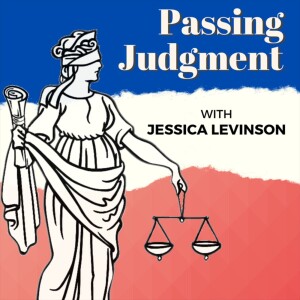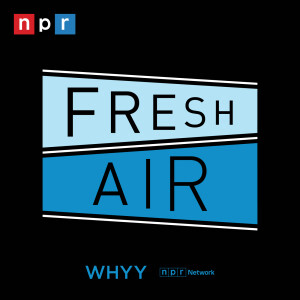

Passing Judgment
https://feeds.cohostpodcasting.com/sufSZhNAEpisode List

Inside the Government Shutdown: Causes, Impact, and What Comes Next with Nicholas Wu
In this episode of Passing Judgment, host Jessica Levinson is joined by Politico’s Nicholas Wu to break down the causes and consequences of the ongoing government shutdown. They discuss how partisan divides, failed budget talks, and the Senate filibuster have led to a halt in government services and potential spikes in healthcare costs. Nicholas shares what this means for everyday Americans, the political strategies on both sides, and why the shutdown could last for weeks. Tune in for a clear explanation of how we got here, what’s happening now, and what may come next on Capitol Hill.Here are three key takeaways you don't want to miss:1. How the Government Shutdown Happened: Nicholas Wu lays out the basic process of government funding through appropriations bills in Congress. He explains that both the House and Senate Appropriations Committees are supposed to agree on funding for each agency by September 30th. This year, they failed to come to an agreement, and attempts at a stopgap measure (a continuing resolution) fell through, triggering the shutdown.2. Partisan Gridlock & Narrow Legislative Majorities: A recurring theme is the impact of narrow majorities in Congress and the difficulties that creates for reaching agreements. Wu highlights that with such close margins, especially in the Senate due to the filibuster rule, bipartisan cooperation is necessary but often lacking. The lack of communication between parties and between Congress and the White House is also emphasized as fueling the stalemate.3. Impact of the Shutdown on Everyday Americans: The conversation shifts to what the shutdown actually means for federal services and the public. Wu notes that the effect varies depending on where people interact with the federal government. Essential services (like air traffic control) keep running, but might do so without pay, while some non-essential services are halted, affecting federal workers and potentially local economies.Follow Our Host: @LevinsonJessica

Legal Perspectives on Federal Action in Oregon: State vs. National Authority
In this episode of Passing Judgment, Jessica breaks down the Trump administration’s move to federalize the National Guard in Oregon amid Portland protests. She explains Oregon’s lawsuit against the federal government, outlining key arguments such as the improper use of federal authority, possible violations of the Posse Comitatus Act, and state sovereignty issues. Jessica evaluates each argument’s strength, noting that courts usually defer to presidential discretion in these cases. The episode offers a clear overview of the unfolding legal battle and what’s at stake for both state and federal powers.Here are three key takeaways you don't want to miss:1. Federalization of the National Guard in OregonThe episode opens by discussing the Trump administration’s decision to federalize the National Guard in Oregon—specifically Portland. This move was made over local objections and parallels previous situations, such as federal intervention during protests in Los Angeles.2. Oregon’s Legal Arguments Against FederalizationThe majority of the episode breaks down the legal case Oregon is making in its suit against the federal government.3. Legal Analysis of Oregon’s ChancesEach argument is weighed in terms of likely success. The host points out that courts have historically given substantial deference to presidential discretion in these national security and public order matters, making Oregon’s position a difficult one.Follow Our Host: @LevinsonJessica

How Texas Redistricting Sparked a National Political Battle with Guest David Goodman
In this episode of Passing Judgment, Jessica is joined by David Goodman of the New York Times to break down the unexpected surge of mid-cycle redistricting in Texas. They discuss how political maneuvering by Republicans—aimed at flipping congressional seats—has triggered national reverberations, with states like California now considering similar actions to counter Texas. The episode dives into the partisan motivations, the legal and political pushback, and the threat to independent redistricting commissions. Together, Jessica and David make sense of the fast-evolving redistricting landscape and its far-reaching impact on representation and the future balance of power in Congress.Here are three key takeaways you don't want to miss:Mid-Cycle Redistricting—Why Now? The episode opens with an exploration of why an unusual mid-cycle redistricting is being discussed in 2025, even though redistricting typically happens every ten years after the census. The trigger for this push is political: Republicans, facing a narrow margin in the U.S. House, sought ways to gain additional seats, focusing first on Texas where state Republican control made this feasible.The Politics and Justification of Gerrymandering Both Jessica and David highlight that Texas Republicans were fully open about the political motives behind redrawing district lines—to flip as many as five Democratic seats to Republican. They justified this by pointing out gerrymandering in Democratic-led states and emphasizing partisan advantage as allowed by the Supreme Court, which has found political gerrymandering to be outside federal judicial review.The Domino Effect—Other States Respond Texas’s actions triggered similar conversations in other states. However, David points out that most opportunities for follow-on aggressive redistricting are found in Republican-led states because many Democratic-led states (like California and New York) have independent redistricting commissions, which limit the legislature’s ability to redraw maps for partisan gain. States specifically considered for similar moves include Indiana, Missouri, and Florida, while California emerged as the prime Democratic candidate, though with significant procedural hurdles.Follow Our Host: @LevinsonJessica

Can the FCC Suspend Jimmy Kimmel? Legal Issues Behind the Show’s Controversy
In this episode of Passing Judgment, Jessica Levinson unpacks the legal issues behind Jimmy Kimmel’s temporary show suspension. She explains the distinction between private action by ABC and possible government coercion from the FCC or the President, outlining why the First Amendment generally protects speech from government—not private—actions. Jessica also discusses the limited circumstances under which the FCC could revoke broadcast licenses and what this case means for free speech and media organizations moving forward.Here are three key takeaways you don't want to miss:1. The Suspension and Return of Jimmy Kimmel’s ShowJessica Levinson opens the episode by explaining the sequence of events around Jimmy Kimmel’s temporary suspension from ABC after a controversial comment in his monologue. She emphasizes that although he has now been returned to air, the legal issues discussed still remain relevant.2. The Role and Limits of the First AmendmentA central theme is clarifying what the First Amendment protects. Jessica explains that the First Amendment limits government action against speech, not actions taken by private entities like ABC. If ABC alone had suspended Kimmel with no government involvement, it would not be a First Amendment issue.3. Government Involvement and the FCC’s RoleThe episode explores concerns about potential government overreach, specifically whether statements made by the FCC chair or the President could constitute government coercion. Jessica details how, if the government pressures a private company to take action against someone’s speech, First Amendment concerns are triggered.Follow Our Host: @LevinsonJessica

Can the President Fire a Federal Reserve Governor? The Lisa Cook Legal Showdown
In this episode of Passing Judgment, we delve into the high-stakes legal battle over the attempted removal of Federal Reserve Governor Lisa Cook. Jessica explains the Trump administration's push to fire Cook, the court's decision to reinstate her, and the looming emergency appeal. Tune in as we explore the legal protections for Fed governors, the fight over presidential power, and why this showdown could impact both the central bank’s independence and the broader economy.Here are three key takeaways you don't want to miss:Legal Battle Over Federal Reserve Independence: Jessica discusses the attempt by the Trump administration to fire Federal Reserve Governor Lisa Cook. She explains this centers on whether a president can remove a sitting Fed governor and under what circumstances, which is a pivotal question about the independence of the central bank.The Law and Statutory Interpretation: The conversation delves into the Federal Reserve Act, which only allows removal of board members “for cause.” There’s debate on what “for cause” means—whether it should be restricted to on-the-job misconduct or include actions before taking office. The district court judge sided with the narrower reading, that it should only pertain to conduct while in office.Due Process and Rights of the Removed Official: A significant part of the discussion is about whether Lisa Cook was given due process. The judge found she likely wasn’t given adequate notice or opportunity to respond to the allegations, which could be a violation of her rights.Follow Our Host: @LevinsonJessica
Create Your Podcast In Minutes
- Full-featured podcast site
- Unlimited storage and bandwidth
- Comprehensive podcast stats
- Distribute to Apple Podcasts, Spotify, and more
- Make money with your podcast












